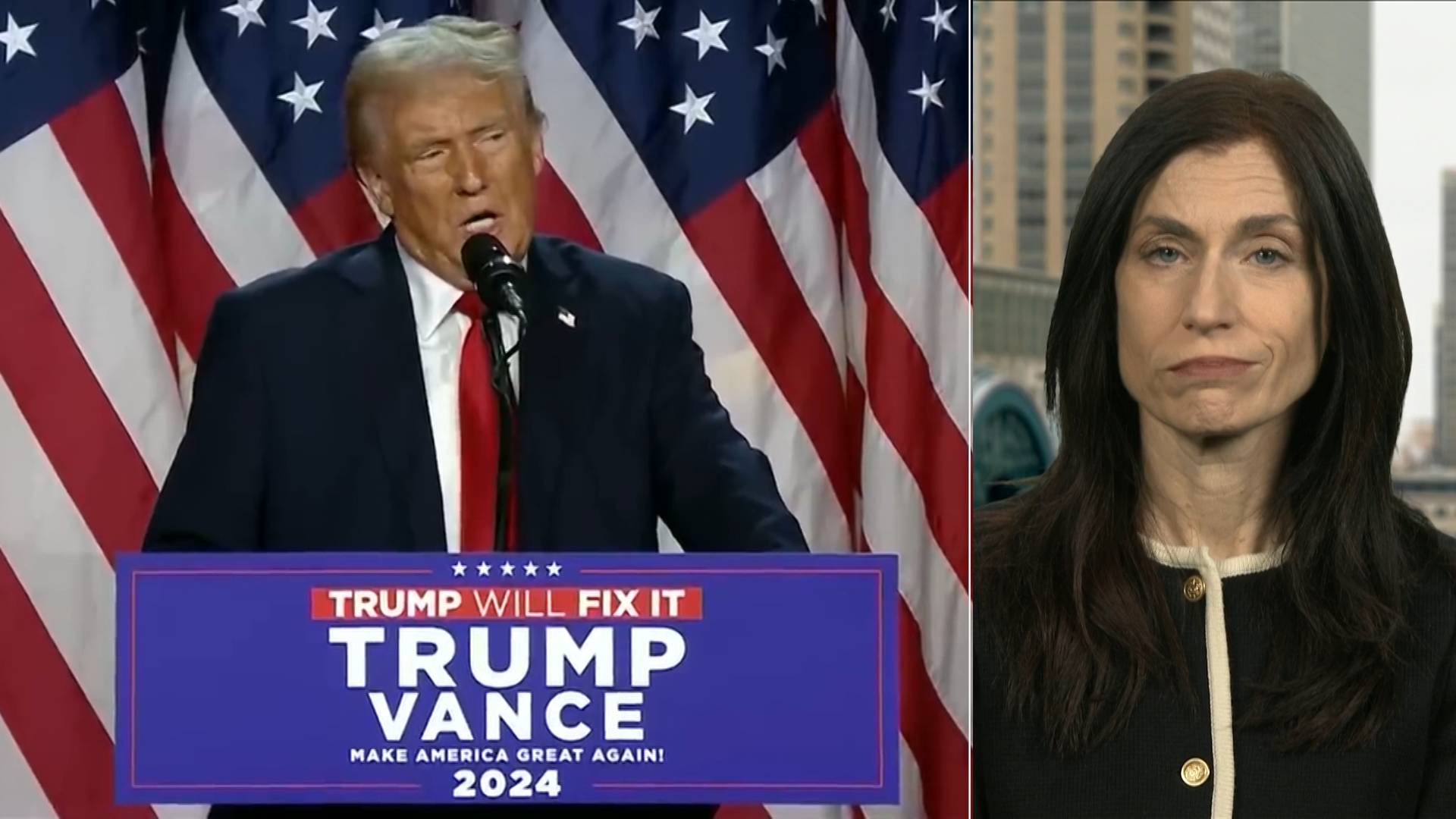This is a rush transcript. Copy may not be in its final form.
AMY GOODMAN: This is Democracy Now!, democracynow.org, “War, Peace and the Presidency.” I’m Amy Goodman, with Nermeen Shaikh.
NERMEEN SHAIKH: We end today’s show looking at what some are calling Donald Trump’s #MeToo Cabinet, from Pete Hegseth to Linda McMahon to Trump himself. A number of Trump’s Cabinet picks have been accused of sexual misconduct or covering up sexual abuse.
Trump’s early pick of former Florida Congressmember Matt Gaetz for attorney general was shot down after at least four Republican senators opposed his confirmation over sexual misconduct allegations.
Now Trump is pushing hard to keep the rest of his picks on track, including former Fox host Pete Hegseth for defense secretary and Robert F. Kennedy Jr. for health and human services secretary. Hegseth paid an undisclosed amount to a woman who accused him of sexual assault, and has called for eliminating diversity, equity and inclusion practices from the military. Meanwhile, RFK has been accused by his former — his children’s former babysitter of sexual abuse.
Even one of the few women Trump has chosen, Linda McMahon for education secretary, the former executive with World Wrestling Entertainment, faces allegations that she and her husband, Vince McMahon, failed to stop a ringside announcer from sexually assaulting young boys in the 1980s and ’90s. Vince McMahon has also been accused of raping a WWF referee.
AMY GOODMAN: For more, we’re joined by Deborah Tuerkheimer, professor of law at Northwestern University, author of Credible: Why We Doubt Accusers and Protect Abusers.
Welcome back to Democracy Now!, Professor Tuerkheimer. There’s so much to talk about here. You have a huge onslaught against the Iowa Republican Senator Ernst, who herself is a lieutenant colonel in the Iowa National Guard, was raising serious questions about defense secretary nominee Hegseth, herself a sexual assault survivor, but last weekend there was an enormous onslaught as a result of an ad campaign against her in Iowa — this after the election, but she’s up in 2026 — getting her to support Hegseth. Talk about the significance of what he’s been charged with. And go through them one by one, right up to President-elect Trump.
DEBORAH TUERKHEIMER: Well, I think it’s important to go back in time all the way to 2016 on the release of that Access Hollywood tape. Recall that Donald Trump was heard boasting about what he and other powerful men could do to women. And for many women who heard that, I think it really stood in for male entitlement and the very real notion that men could get away with anything. This is, of course, in the midst of Donald Trump’s facing multiple allegations of sexual abuse in the court of public opinion.
In the course of researching my book, I heard repeatedly that for many women, this was really about what had been done to them, as well. And I say this because I think it helps us to understand the explosion of the #MeToo movement just about a year later. It’s not widely understood that Donald Trump had any connection to the #MeToo movement, but I think he really seeded the ground for what came about after his election. As one woman said to me, you know, “The idea that structures — structures — are in place to protect men like Donald Trump enabled me to come forward with my own allegations.”
So, if we fast-forward, of course, to the presidency, to Donald Trump’s statements around Brett Kavanaugh’s nomination, the notion that this is a, as Donald Trump described it, “a very scary time for young men in America,” the idea that women lie when they come forward with allegations of abuse, and then, of course, Donald Trump’s own finding against him, finding of civil liability for the sexual abuse of writer E. Jean Carroll, and we come to this latest election, I think it’s fair to say that Trump really is the embodiment of a male entitlement that is much on the minds of people who are watching these Cabinet nominations. There’s really a contest over what set of norms applies in the world.
NERMEEN SHAIKH: Well, Deborah, the last time Trump won, in 2017, at the same time as his inauguration, there was a massive Women’s March opposing him as president. Do you see a similar mobilization now, especially in light of the Cabinet picks — not just him, but his Cabinet picks?
DEBORAH TUERKHEIMER: My sense is that the opposition, the resistance, the mobilization is more targeted this time around. And so, rather than a big march on Washington, you know, groups are focusing their efforts on the particular issues that they may be able to make progress on. And so, the decision of Matt Gaetz to step down, I think, was widely seen as a small but significant victory in this effort, again, to sort of reclaim or claim a set of norms around sexual abuse, because, of course, the #MeToo movement was about and continues to be about not just individual allegations, but this larger question of who’s held accountable and what kind of cultural toleration do we have for abuse by powerful men.
AMY GOODMAN: And we also want to ask you about McMahon, who has been nominated for education secretary, though, to say the least, not involved with education?
DEBORAH TUERKHEIMER: Right. So, I want to be clear that the nomination of a Linda McMahon for the Department of Education or a Pete Hegseth for the Department of Defense, these are not only expressions that have symbolic value about which worldview is controlling, but there are also tangible consequences that flow. These are certainly agencies with their own fraught histories around responding to sexual abuse allegations, and so it’s very meaningful who’s at the very top of these agencies and what kinds of attitudes, orientations they bring to the job. It’s very concerning for anyone who cares about justice for survivors to contemplate the heads of these agencies being individuals not only with their own sets of allegations, but also very clearly expressed views about these allegations, whether they ought to be taken seriously, whether they ought to be pursued, whether there ought to be accountability for those who perpetrate these kinds of harms.
AMY GOODMAN: And very interesting that the people who are raising questions at this point, even under enormous pressure, are the Republican and Democratic women senators who will be confirming, or not, these nominations.
DEBORAH TUERKHEIMER: Yes. This is — you know, these are political questions in the end, and it will be very interesting to see whether the view of a majority of Americans — in latest polling, it’s very clear that nearly two-thirds of Americans believe that sexual assault allegations are disqualifying when it comes to these kinds of positions, these very high-level positions. Whether we continue to protect people who commit these kinds of abuses has everything to do with whether we are able to upend the structures that provide this kind of impunity.
AMY GOODMAN: Finally, Trump is ringing the opening bell of the New York Stock Exchange today, just blocks from the Manhattan courthouse where he became the first former president to be convicted of a felony. We’ll leave it there. Deborah Tuerkheimer, professor of law at Northwestern University, author of Credible: Why We Doubt Accusers and Protect Abusers. I’m Amy Goodman, with Nermeen Shaikh, for another edition of Democracy Now!











Post comments (0)